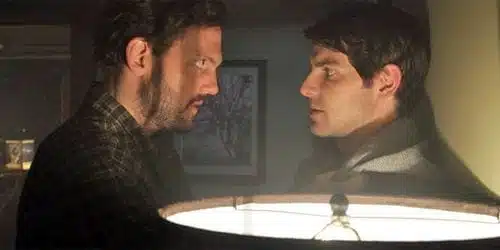
Something strange is happening to homicide detective Nick Burkhardt (David Giuntoli). He thinks he’s engaged in his usual buddy cop banter and routine crime scene investigations with partner Hank (Russel Hornsby). But, even as the people he encounters appear normal at first, their faces start momentarily transforming into a gruesome arrangement of snarled teeth and horns. Some appear like haggard witches, others fork-tongued demons. What big teeth you have, indeed.
Maybe it’s nerves, he thinks at the start of Grimm, since he recently bought an engagement ring to propose to his girlfriend Juilet (Bitsie Tulloch) or maybe it’s that his Aunt Marie (Kate Burton) has showed up in town unexpectedly with a bleak prognosis (cancer) and an Airstream trailer full of exposition about their shared family history. But while he tries to rationalize, we already know that these are not merely stress-induced hallucinations; they’re the plotty beginning of a new fantasy series, in the tradition of Buffy, in which Nick will learn quickly about his birthright and special powers that will help him solve crimes and fight evil.
What Nick discovers before the first commercial break is that he’s a Grimm, one of the last descendants of the Brothers Grimm, the German brothers who wrote those classic fairy tales, not as fiction, but as a literal documentation of what “really happened.” According to Marie, Grimms are both vulnerable and powerful as they’re able to protect regular folk because they can see witches, wolves, and other fairy tale folk as they really are. How this gift can help Nick in his police work is obvious, but also silly. It doesn’t take inherited superpowers to deduce the common thread among cases involving missing girls last seen in red sweatshirts.
That’s precisely the case in this pilot episode, as we see a college student in a red hoodie on an early morning run soon torn to pieces in the woods. Even before she’s reduced to disembodied limbs and trace evidence, we know from years of CSI and The X Files that she’s the victim du jour mostly from the way the camera shows her ponytail bouncing in step with her pink Nikes.
But we also know that such cop shows are also are fairy tales, and when square-jawed Nick learns, in this cop show, that as a Grimm he will protect and serve those who cannot see villains as they really are, it means he will primarily protect and serve women, who are Grimm’s go-to victims: young co-ed, little girl on her way to grandma’s house, and even terminally-ill Aunt Marie are not safe from the Big Bad Wolf.
Filmed and set in a soggy, green-washed Portland, Oregon, its procedural plotting and visual flair carry it along when it occasionally lapses into something like camp. Early on, Nick and Aunt Marie are under siege by snarling, snaggle-toothed bad guys (when she, the convalescing cancer patient, finds the strength to fell a beast twice her size it’s an oddly ambiguous feat, never explained as either part of her Grimm nature or a burst of adrenaline). The scene fades from empty, eerie street to the same one teeming with cops, cars, and onlookers — a visual superimposition of the modern onto this elaborate fairy tale history.
Still, there’s something unmistakably throwback about Grimm, and perhaps that’s the point. It shrugs away any concrete social context and sidesteps a snarky post-modern sensibility, even as one reformed man-eater confesses to Nick that he keeps himself straight on a steady stream of “diet, drugs and pilates.” Such jokes — and the crimes, too — are imitations of those we’ve seen on TV over and over again. This lack of imagination is especially inexcusable when playing with a genre replete with grisly characters and offbeat offenses.
And even if we assume that it means to be prosaic, as another sort of generic interrogation, Grimm disappoints. We all know that fairy tales in and of themselves were originally shared as moral lessons and didactic cautionary tales, but to function as such, they need clear lines drawn between ghastly acts and those who are supposed to be instructed. What does a murdering mailman teach us about our own fears and desires? Not much.
As Grimm grasps for compelling analogues between fairy tales’ villains and ours, its stories turn exceedingly literal: wolves urinate in the corners of their lawns to mark their territory, rather than lurk (and mark) in ways less obvious and more culturally meaningful. There’s certainly room here for these archetypes to be explored as the series develops, but when Nick’s prime suspect for the red-hoodie crimes turns out to live in an actual cottage in the woods, it doesn’t bode well for how these stories might reflect the lives of viewers.

